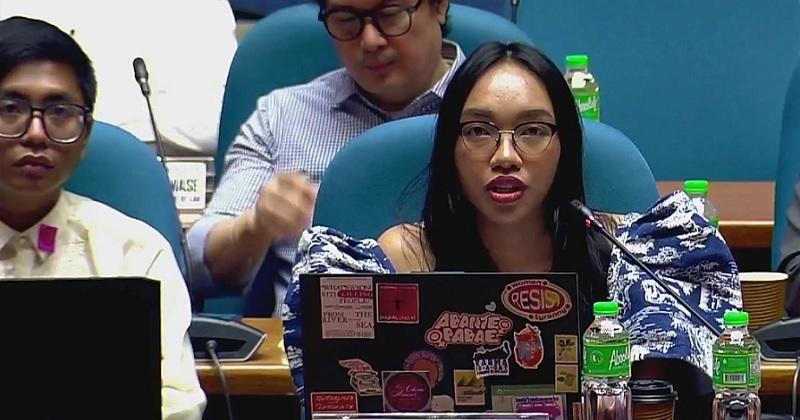Nat’l student orgs, La Salle official: Foreign ownership won’t improve access to quality education

A university official and officials of two national student organizations on Monday said that allowing more foreign ownership of schools would not improve access to quality education in the Philippines but instead worsen it.
"There is a mispriority when there is a learning crisis and our answer is to attract foreign direct investments," said National Union of Students of the Philippines (NUSP) deputy national spokesperson Lance Avery Alo at the House Committee of the Whole's deliberations on Resolution of Both Houses 7 (RBH 7).
RBH 7 seeks to lift the 40% limit on foreign ownership of vital industries, including education.
"Students want quality education and we believe that quality education in the sense that it is nationalist, scientific and mass-oriented will be harder to enjoy under foreign ownership, control and administration," Alo said.
He added that the current education system is already "colonial, commercialized, and repressive," already "[serving] the interests of foreign countries and transnational companies. It is seen as a means to generate profit rather than be seen as a social service."
Foreign ownership, control and administration of schools will make the situation even worse, Alo said.
"Primarily it will accelerate the denationalization of education that will lead to the deprioritization or, at worst, removal of subjects such as Philippine history, culture, language, civics and many other humanities-related subjects because they are not deemed marketable or advantageous to profit generation," he continued.
"Needless to say, foreign entities will not invest in education in the Philippines if they do not stand to gain profit.
"Under this orientation, as it is already happening right now, our schools will be modified to ensure profit and production of cheap and docile labor rather than to achieve the social function of education, [which is] to promote social good, even if it is against business interests. to foster critical thinking, even if it means being critical of those in power, and to ask questions, even if it leads to disruption," he said.
Alo added that if school tuition continues to rise at the current rate, the cost will in time become prohibitive for the average Filipino. "Opening our schools to foreign ownership will only make the situation worse, because it will lead to more commercialization," he said.
"Education is a basic human right. In order for such a right to be fully realized, it should not be commodified."
For his part, De La Salle University vice president for Academic Affairs Dr. Robert C. Roleda said that school fees in foreign-owned schools are much higher than those of their locally owned counterparts, so there will be no competition that could bring down tuition rates of Philippine-based schools.
“When foreign schools come in [here], we will probably not follow suit [setting higher fees] because foreign schools’ fees are four times higher than ours. If we do that, we will be failing in our mission or provide quality education to as many Filipinos as possible,” he said.
“We don’t really look at foreign [school] institutions as competitors because we have different market levels,” Roleda added.
House Deputy Majority Leader Janette Garin of Iloilo stressed her support for allowing foreign ownership of educational institutions, saying it will provide more opportunities for Filipino students to be globally competitive.
"Does it make you less of a Filipino if you wish to have a better quality of education? Does it make you less of a Filipino if you aspire to be competitive and teach our future generation and give them that opportunity that for now, is only enjoyed by the rich?” she said.
"When we open up the Philippines, it is simply because the current administration wants Filipinos to experience and benefit from opportunities that are otherwise only exclusive to those elite few,” Garin added.
College Editors Guild of the Philippines (CEGP) deputy spokesperson Angeli Mari Rodenas, meanwhile, called it a "delusional assumption" that foreign school ownership would improve access to quality education of Filipinos.
"How can foreign ownership improve access to quality education, especially to disadvantaged and disadvantaged marginalized groups? The primary concern of the students is to attain quality education, and this quality education is not necessarily exclusive to foreign owned institutions,” she said.
Rodenas said the government should instead address the lack of access to quality education in state-run universities and colleges first, especially in the country's top school, the University of the Philippines.
She said that data gathered by UP's student publication the Philippine Collegian showed that 50.15% of those who passed the UP College Admission Test in 2023 graduated from private schools, while 24.02% came from state-run science schools.
Those who graduated from public schools who made the UPCAT, Rodenas said, only reached 20.04%.
“This means that three-fourths of those who passed the UPCAT are from private schools or public science high schools which are perceived as the best high schools in the Philippines. This only reveals that the system favors students who already have the advantage [in terms of resources]. If anything, foreign ownership will only improve access to quality education to those who are already privileged," she said. — BM, GMA Integrated News




